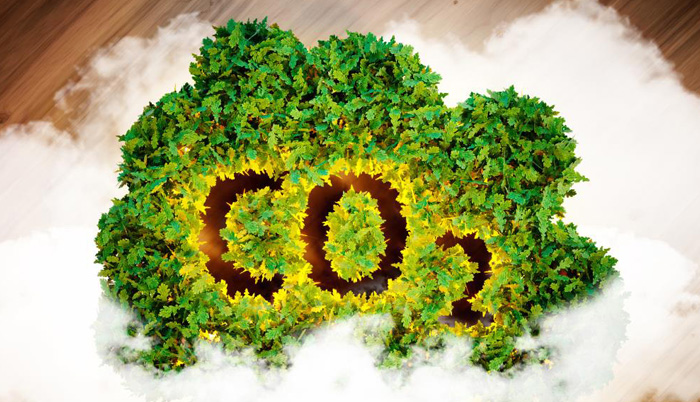![]() Home > Health
Home > Health
Craig Idso: High CO2 In Summer Lessens Temperature Stress In Plants

News Target | Natural News
![]() July 29th, 2022 | 15:12 PM |
July 29th, 2022 | 15:12 PM | ![]() 631 views
631 views
NATURALNEWS
Environment experts have made it a habit every summer to blame anthropogenic global warming for the rise in temperatures and the occasional heatwaves.
Plant scientists say that high carbon dioxide (CO2) levels cause plants to thicken their leaves, making them less efficient in sequestering atmospheric carbon. Craig Idso, founder and CEO of the Center for the Study of Carbon Dioxide and Global Change, debunked this in a blog post.
According to Idso, higher levels of CO2 can help alleviate many of the stresses plants experience during heatwaves.
“Heat stress can cause a multitude of challenges to plant growth and survival, including dehydration and oxidative damage to biomembranes from elevated reactive oxygen species (ROS). Elevated levels of CO2 have been shown to lessen the severity of this stress,” Idso said.
“There is interest in determining the interactive effects of heat stress and atmospheric CO2 on plants given predictions of future elevated temperatures and CO2 concentrations.”
In a study published in 2018 on Frontiers in Plant Science, the interactive effects of elevated CO2 and heat stress on a range of photosynthetic and chlorophyll fluorescence parameters, as well as the cellular redox state of tomato plants, were probed. The research was conducted in environmentally controlled growth chambers, where tomato seedlings were exposed to CO2 concentrations of either 380 parts per million (ppm) or 800 ppm.
After an acclimation period of 48 hours, half of the seedlings in each CO2 treatment were subjected to 24 hours of heat stress. It was followed by a 24-hour recovery period. After a total of 48 hours, elevated CO2 was able to fully ameliorate the harmful effects of heat stress on the net photosynthesis of the tomato plants.
The authors of the study noted elevated CO2 remarkably reduced heat-induced damage to photosynthetic apparatus and promoted electron transport in the chemical component Photosystem II and protein complex Photosystem I by maintaining proper redox balance.
Similar research published on the Journal of Experimental Botany examined the interactive effects of elevated CO2 and heat stress on the photosynthesis, biomass and grain yield of wheat. Temperatures were maintained at 22/15C (day/night) in the control treatment. Thirteen weeks after planting, heat stress was enacted on half the plants in each CO2 treatment by raising the day/night temperatures to 40/24C for five days. Then, the heat-stressed plants were returned to the control temperatures. Adequate water was supplied to avoid the effects of water stress.
The researchers found that elevated CO2 enhanced net photosynthesis by 36 percent in non-heat-stressed plants, whereas high-temperature stress reduced this parameter by 42 percent. In the combined elevated CO2 and heat stress treatment, net photosynthesis was not reduced. According to the researchers, “elevated CO2 protected photosynthesis by increasing ribulose biphosphate regeneration capacity and reducing photochemical damage [caused by] heat stress.”
“In nearly every instance, these studies demonstrate the air’s rising CO2 content is helping plants better cope with and endure high-temperature stresses,” Idso wrote.
“When the next summer heatwave arrives along with all the negative spin stories demonizing CO2 as its cause, I hope you will remember the numerous scientific studies proving rising CO2 levels helps plants better withstand and recover from temperature-induced stresses.”
Elevated CO2 heightens the medicinal properties of herbs
In a separate blog published a month ago, Idso highlighted that rising atmospheric CO2 will not alter the health-promoting substances found in medicinal or “health food” plants. It actually enhances them.
He cited research done in 2021 that investigated the nutritive values, phytochemicals and antioxidant activities of both caraway sprouts and mature plants. Caraway (Carum carvi), an important medicinal plant, is used in treating a number of ailments, including diarrhea, asthma, cholera and hypertension.
The research also noted that caraway fruits “have been prescribed in herbal mixtures as a drug for digestive, carminative and lactogenic disorders,” and they are also utilized as “antiallergic, antibacterial, anthelmintic, antifungal, bronchodilator and cholinergic agents.”
The researchers grew the herb in two controlled environments: One environment contained 400 ppm CO2 and the other one was with an elevated CO2 level of 620 ppm CO2. The herbs were harvested as sprouts after nine days and as mature plants after 45 days of growth.
They found that the increased CO2 environment enhanced photosynthesis, the chlorophyll content, and the fresh and dry weight of the plants. In the sprouts, these increases were 66 percent, 50 percent, 64 percent and 120 percent, respectively. In the mature plants, these increases were 40 percent, 44 percent, 48 percent and 29 percent, respectively.
The CO2 enhancement also raised the carbohydrate, protein, fat and crude fiber content of the plants. The CO2-enriched caraway also produced more minerals, vitamins, amino acids, phenolics and antioxidants, and ultimately had more potent antibacterial activities.
Source:
courtesy of NATURALNEWS
by Belle Carter
If you have any stories or news that you would like to share with the global online community, please feel free to share it with us by contacting us directly at [email protected]